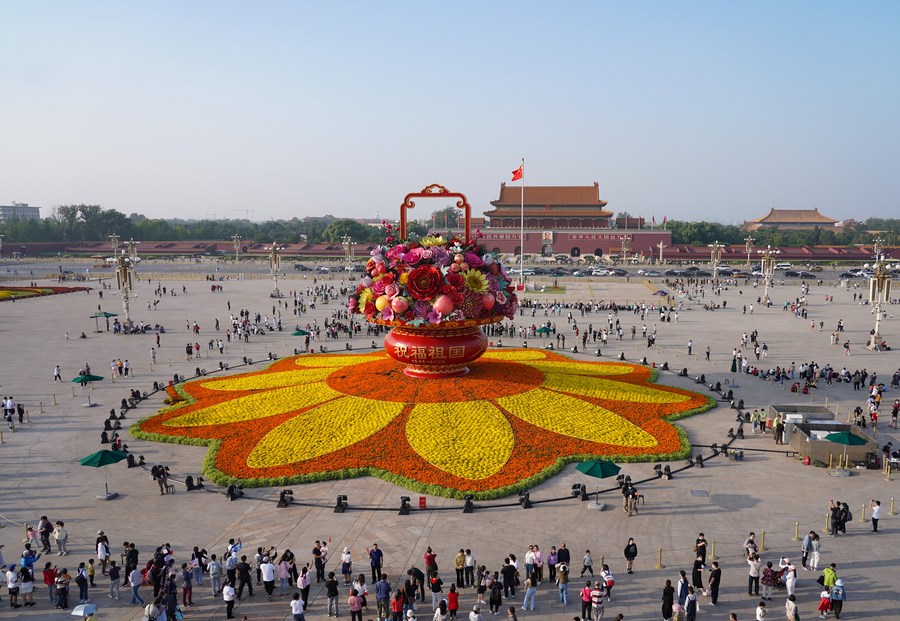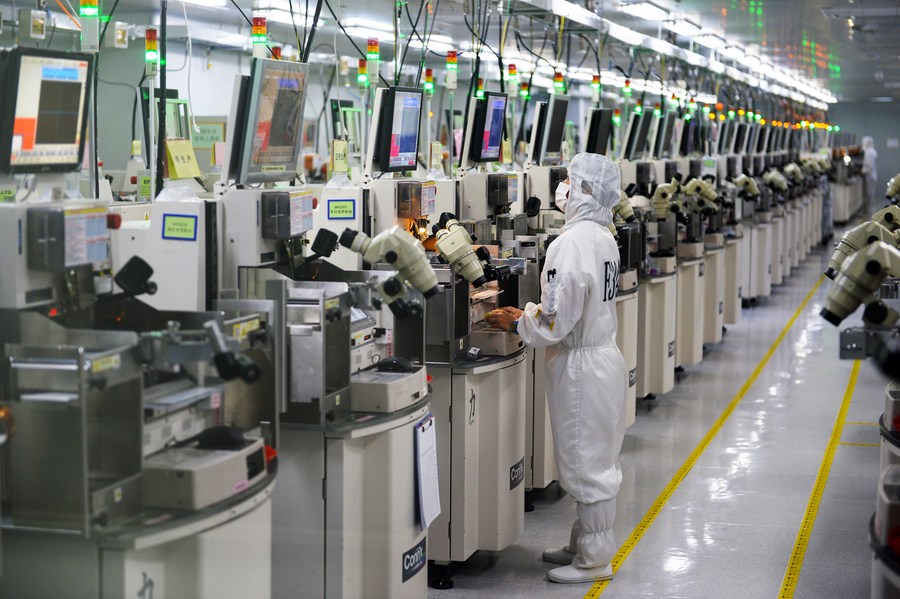

Photo taken on Sept. 25, 2022 shows a "flower basket" at Tian'anmen Square in Beijing, capital of China. (Xinhua/Chen Zhonghao)
For some time, a handful of countries have been peddling a "de-risking" approach toward China, a term coined to signal a policy shift from decoupling.
But de-risking, in fact, is just decoupling in disguise. China's track record shows the country poses no risk; what it stands for is peace, growth and innovation.
CHAMPION OF PEACE
China has always been a peace-loving country. Back in 1954, China initiated the Five Principles of Peaceful Coexistence. Today, it is the only country that pledges "a path of peaceful development" in its Constitution. It is also the only one among the five nuclear-weapon states that makes the promise of no-first-use of nuclear weapons.
China stands as a force for peace. It says explicitly it "will not tread the old path of war, colonization and plunder taken by some countries." Plus, steady economic growth and long-term social stability for 1.4 billion people are, in itself, a safeguard, not a risk, for world peace and security.
China has made active efforts to promote peace on the global stage. In March, China brokered a deal between Saudi Arabia and Iran to reestablish diplomatic relations and reopen embassies, ending seven years of tensions. The rapprochement turned a new page in relations between the two countries and triggered a wave of reconciliation in the Middle East.
On the ongoing Ukraine crisis, China has all along advocated peace talks. Following the phone call between Chinese President Xi Jinping and Ukrainian President Volodymyr Zelensky in April, China's special envoy has recently traveled to Ukraine, Poland, France, Germany, the European Union Headquarters and Russia to pool international consensus for a political settlement. During his trip, The Special Representative of the Chinese Government on Eurasian Affairs Li Hui said he had in-depth and candid exchanges with all parties, and the visit has "achieved expected goals."

Photo taken on Oct. 22, 2021 shows decorative installations near an entrance of the National Exhibition and Convention Center (Shanghai), the main venue for the China International Import Expo (CIIE), in east China's Shanghai. (Xinhua/Fang Zhe)
POWERHOUSE OF GROWTH
China is a stabilizer of the world economy. Its contribution to global growth averaged over 30 percent from 2013 to 2021, making it the biggest contributor. In 2022, China's GDP reached 121 trillion yuan (17.5 trillion U.S. dollars), and its growth outpaced most major economies.
The International Monetary Fund recently projected that the Chinese economy will grow 5.2 percent and account for a third of global growth this year. No doubt China is a key contributor to global growth and a major player in global supply chains, in particular, in the post-COVID era.
Facing strong headwinds caused by COVID-19 and complicated by conflicts, China takes effective steps to keep supply chains stable and prevent risks of disruption, testifying to the strong resilience of its economy.
While some use economic resilience as a catch-all to justify self-serving practices, China's story has been another story: Investing in economic resilience by no means requires shifting away from shared growth.
Instead of closing its door, China has been expanding its high-standard opening-up. Seeking to foster a better business climate and build a larger market, it hopes to create more opportunities for the world with its own development.

An employee works at an intelligent workshop of Lightning optoelectronic Co., Ltd. in Anxi County of Quanzhou, southeast China's Fujian Province, June 16, 2023. (Xinhua/Liu Yongzhen)
The China International Import Expo is a clear demonstration of China's commitment to shared growth. Hosted by China since 2018, the annual fair attracted 284 Fortune Global 500 firms last year, and has become a magnet for global participants to exhibit their premium products. The logic is simple: If one decouples from China in the name of de-risking, it will only decouple from cooperation and development.
HUB OF INNOVATION
China today is fast becoming a leading innovator in a variety of sectors, such as 5G, quantum computing and high-speed railway. In the Global Innovation Index published by the World Intellectual Property Organization, China's ranking has risen steadily for 10 years straight. Last year, it ranked a record high of 11th in global innovative performance. In 2022, China's research and development spending surpassed 3.09 trillion yuan (about 456 billion U.S. dollars), up 10.4 percent from the previous year.
China never innovates behind closed doors. It shares its technologies with partners worldwide and encourages cooperation with the global community. To the world, an innovative China is a contributor, rather than a source of risk.
Seeing the huge potential of China's high-tech industry, some governments have used national security concerns as an excuse to slap restrictions on exports of critical technologies and equipment to China. But such moves violate market rules and will only impede global supply chains.
Politics aside, businesses vote with their feet. Lately, an increasing number of them are setting up not only plants, but also research centers in China. The addition of "innovating with China" to "made in China" is a vote of confidence for China's innovation environment and market prospects.
In a world fraught with thorny challenges, countries need to come together, not move apart. Many are explicitly aware of the costs of moving apart. U.S. Treasury Secretary Janet Yellen said decoupling from China "would be disastrous for both countries." European Commission President Ursula von der Leyen said decoupling is "clearly not viable, desirable or even practical" for Europe.
It's time to quit playing with words. To de-risk is to decouple, and to decouple is to destabilize and even derail.
For every beneficiary of globalization, the right thing to do is to safeguard global trade and keep supply chains smooth. There is no need to de-risk from China, for a growing China will only provide the world with a much-needed boost, not risk.
Yi Xin is a current affairs commentator based in Beijing.
The first training camp of the Center of Innovation and Maritime Excellence, supported by Chinese companies, was opened Thursday in Djibouti City, the capital o...